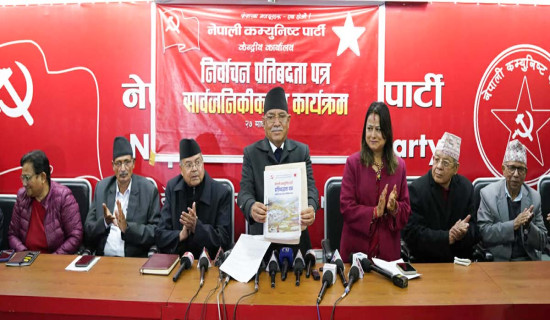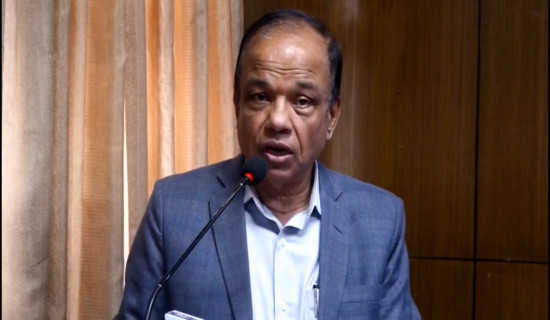- Wednesday, 11 February 2026
Stakeholders' Role In Lawmaking
The school teachers hit the streets last month, demanding that the new education law be enacted at the earliest to honour the terms of agreements entered into with the teachers in the past. The nationwide strike had paralysed the curricular activities in the community schools, sending alarm bells to the power corridors at Singha Durbar. The teachers were indeed up against proposals in the education bill, which has long been pending in the parliament that gives local governments the oversight role of schools and imposes a ban on teachers from associating with the political parties, in addition to the raise in their perks and remunerations.
The teachers ended their protest following the deal, committing to respond to the issues raised by the teachers. However, some sections of teachers have expressed their reservations about the new budget announced by the government the other day, contending that their interests have not been properly covered and addressed in the budget. Nevertheless, the question that annoys the onlookers is why the stakeholders are forced to come out onto the street to oppose the legislative proposals only after they are registered and discussed in the parliament for their passage and endorsement.
Transparency
Why do responsible agencies fail to resort to openness and transparency for an elaborate discussion and broad-based deliberation on the provisions of the bills before their submission to the parliament for scrutiny, consideration and enactment? Such consultation with stakeholders and the sectors concerned is mandatory according to the Bidheyak Ain (Bills Act) enacted by the parliament. Moreover, dialogue and deliberation form the core of democracy. In order to produce collaborative, effective and representative rules, the procedure of law-making should embody pre-legislative consultation as a fundamental democratic requirement.
Legislations are said to incorporate the people’s collective will and aspirations that are consolidated by elected representatives who constitute the lawmaking organs of the government. Nepal’s constitution vests the authority with the parliament to pass laws at the federal level, and with the Pradesh Sabhas (Provincial Legislative Assemblies) at the province level and Gaun Sabha and Nagar Sabha at the local level. Needless to say, consultation is the key to modern policy making as it builds and enhances democracy when it works well and produces transparent, efficient and accountable procedures.
Pre-legislative consultations aim to improve the efficacy and validate laws at their different stages. In the United Kingdom, before drafting a statute, there is a practice of publishing a “Green Paper” where the stakeholders are consulted for a few months during the drafting of a new law. The UK manual of Parliamentary Procedures states that every legislative initiative must be made in consultation with the stakeholders and authorities concerned.
In India, too, the committee of secretaries, headed by the cabinet secretary, approved a policy a few years ago requiring the central government to place the plans for the new bills and modification of existing legislation on their website, inviting feedback and opinions from the people. All ministries must put any proposed legislation in the public domain, including the internet, and take steps to ensure broad coverage to ensure access to potential stakeholders.
The fact that the access of public to the draft of the legislation allows the stakeholders and groups concerned to articulate their issues and propose amendments accordingly. In the pre-drafting process as well as in the phase before introduction, significant public commitment to the bill would hopefully go a long way in strengthening the foundation of participatory democracy. The value of participatory democracy depends on popular deliberation to ensure that the contents of the policies on the anvil are understood by the ordinary populace.
It also partly meets the requirement of ground-level research, so that the consideration of stakeholders of the bill or those who are affected by the bill, is taken into account. Moreover, the legislation drawn up and enacted without consultations and deliberation lacks the social dynamics of the community in which the legislation is meant to be applied. The opposition meted out to the Guthi bill in the past and the education bill recently can illustrate the point clearly.
The case of farmers protesting in India a few years ago, expressing their displeasure over the dismantling of the “Mandi System” to bring an end to assured procurement of crops at a minimum selling price. Once there is an end to the minimum selling price, there might not be any price assurance or any protection to farmers against monetary exploitation, or any mechanism of price fixation.
Absence of deliberation
Farmers had also demanded that they should be provided with minimum selling price assurance in writing by the government, as they fear that the corporate houses might have an upper hand, which will lead to exploitation. The farmers of the Indian states of Punjab and Haryana, where farming is one of the major occupations, had sought the support of the government of their respective states but failed to get any response, thereby leading the farmers to march towards New Delhi to mount pressure on the government of India. The discomfort expressed by farmers reflects the absence of deliberation and participation in the process of making law in India.
Placing citizens closer to the affairs of government decision makers is the fundamental feature of democracy. It has always been proven to have a positive outcome in fostering trust between citizens and the state. It also helps to make the proposed laws effective when it is brought into application and implementation. The Bill Act in Nepal, which was enacted not very long ago, seeks to ensure that the consultation with stakeholders is mandatory to imbibe their ownership and support the process of their implementation.
(The author is presently associated with Policy Research Institute (PRI) as a senior research fellow. rijalmukti@gmail.com)





-square-thumb.jpg)


-square-thumb.jpg)








